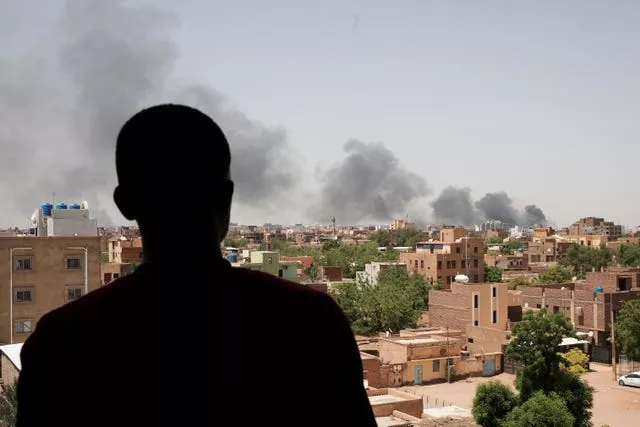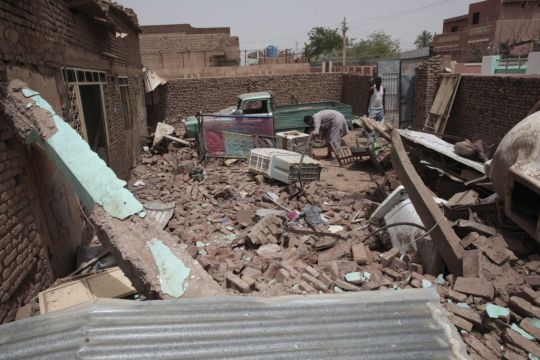Fighting has intensified in Sudan’s war-ravaged province of Darfur during a fragile three-day truce between the country’s battling top generals, killing an estimated dozens of people, residents say.
The truce eased fighting in the country’s capital, creating a lull that has allowed foreign governments to evacuate thousands of their nationals.
Tens of thousands of Sudanese travelled to their country’s land borders with Egypt, Chad and Ethiopia, and to a port city on the country’s Red Sea.
The new clashes targeted civilians in the capital city of Genena, residents said, an area regularly roiled by outbursts of brutal tribal violence.

Locals described attacks by fighters, mostly wearing the uniforms of the country’s powerful paramilitary, on several neighbourhoods across the city early on Thursday, forcing many families to leave their homes.
“The attacks come from all directions,” said Amany, a Genena resident who withheld her surname for her safety.
“All are fleeing.”
Much attention has been centred on the capital’s intense fighting, including airstrikes and artillery and drone strikes, since the country’s military and its powerful paramilitary known as the Rapid Support Forces (RSF) started battling for key government institutions and military bases on April 15.
The fighting in the capital has created dire conditions for many struggling to obtain food and water, and electricity is cut off across much of the capital and other cities.
Multiple aid agencies have had to suspend operations, a heavy blow in a country where a third of the population of 46 million relies on humanitarian assistance.

But there are now more indications other remote provinces are witnessing deadly violence.
Fighting in Genena first escalated earlier this week.
Residents reported widespread looting and destruction of government offices and aid agencies’ compounds in the city, including UN premises and the headquarters of the Sudanese Red Crescent.
Adam Haroun, a political activist in West Darfur, said dozens of people have been killed over the past two days in Genena.
He said the fighting “with light and heavy weapons” has already turned into tribal violence.
Speaking over the phone from Genena’s western neighbourhood of Gamarek, Mr Haroun said tribal fighters were roaming the streets, destroying and looting “whatever they found”.

He said Genena’s main open market has been destroyed.
“The battles are raging right now,” he said over the phone, with the sound of gunfire drowning out his voice at times.
“It’s scorched-earth war.”
Volker Perthes, the UN envoy for Sudan, said late on Wednesday that the Genena clashes have been centred on civilians and run the risk of kicking off a dangerous cycle of violence between rival tribes.
Meanwhile, in Khartoum, residents reported hearing gunfire and explosions in some parts of the capital.
They said the military’s warplanes bombed an RSF position in the upscale neighbourhood of Kafouri.

The RSF confirmed its camp in the neighbourhood was hit.
International pressures have increased for the generals to reach even a short-term sort of peace, with the latest offer coming from Sudan’s neighbour, South Sudan, which split from Sudan in 2011 after years of civil war.
South Sudan’s President Salva Kiir on Wednesday urged the warring sides to extend the ceasefire for three more days to allow civilians access to food and other services, including health care.
Addressing a joint press conference at the president’s office in Juba, acting foreign minister Deng Dau Deng said Mr Kiir has engaged with the leaders of the military and the RSF to launch negotiations to end the crisis.
Mr Deng said Sudan’s army chief General Abdel-Fattah Burhan has accepted the proposal, while Mr Kiir was still engaging with the RSF commander General Mohamed Hamdan Dagalo.
The Sudanese military said it “initially accepted” an initiative brokered by the eight-nation East Africa trade bloc known as the Intergovernmental Authority on Development to extend the current ceasefire for another three days after it expires on Thursday.
The diplomatic initiative would also include direct negotiations between the military and the RSF in South Sudan’s capital, Juba.







